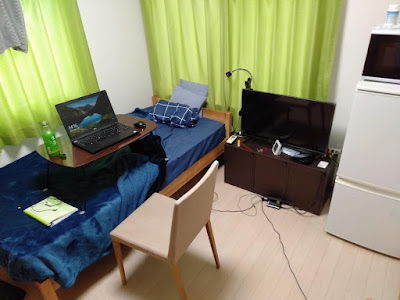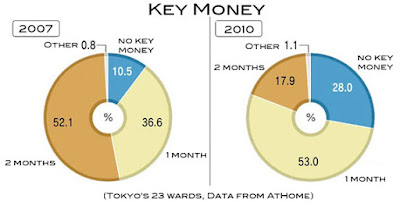My Apartment in Tokyo, Japan
Japan, and Tokyo in particular, is known for its cramped quarters. Much of this simply stems from a lack of physical space. Japan's 126 million people reside in a country of some 378,000 square kilometers (146,000 square miles), less than the size of the US state of Montana--which has 1 million residents. At 333 people per square kilometer, Japan is the 24th most densely populated country in the world, just ahead of Sri Lanka and behind the Philippines.
Many of the more densely populated countries are micro-states or small islands, like Monaco and Singapore. Still, Japan's 24th place ranking is somewhat misleading. Mountain ranges run through all the major islands, and in total, 73% of the country's land area is mountainous. The vast majority of the population is concentrated along the coasts, plains, and valleys. As of 2010, over 90% lived in cities, with 80 million people in urban areas along the Pacific coast of Honshu, the largest island.
 |
| Topography of Honshu, which has over 100 million people (the second most populous island in the world after Java). There isn't much green low-lying space aside from the coast. |
 |
| The prefectures with the four largest metro areas (Tokyo, Osaka, Nagoya, and Fukuoka) have densities above 1,000 per sq km |
The Tokyo metropolitan area is home to 38 million people, making it the most populous metro area in the world. This encompasses a large area extending far from central Tokyo, but still, it equates to a population nearly as large as California in an area smaller than Connecticut. Or for non-Americans, think of putting the whole population of Poland into Northern Ireland, or all Canadians into East Timor. Anyway you cut it, it's a packed place.
So, that was a long way of saying space is at a premium here. You might have seen pictures of closet-style Japanese apartments or capsule hotels in Tokyo, where tourists literally just have a bed to sleep in and no other private space. My apartment isn't that bad; I have a 19 square meter (roughly 200 square feet) place, which includes a small kitchen set-up and separate bedroom. It's certainly cozy by American standards, but nothing out of the ordinary here, and I got used to it after a couple months. I also lived in small apartments in Korea and China--not this small, but it wasn't a big surprise for me.
 |
| Tokyo feels most crowded during rush hour on public transportation; and yes, as a tall white dude I definitely stick out. |
 |
| You may have heard of capsule hotels, where your only private space is a bed. Guests leave their luggage in lockers. |
My place is also close to central Tokyo--I'll do another post on the location--so I'm happy to sacrifice a bit of room for the convenience. Also, the design makes the most of the space. When you walk in the door, there is the customary place to put your shoes (not to be worn indoors of course). On the left are two gas burners next to the sink, after which is the washing machine. I don't have a dryer, so I hang up my clothes in my room to dry. Dryers are uncommon in Japanese households, and I'd already done the air drying method in Korea and China, so no biggie there.
 |
| My front door and luxury kitchen |
 |
| I have two burners, a sink, and then the washer. To the right of the washer is the door to my shower room |
 |
| My shower/sink are in one room and toilet in another |
The other door opens up to a small toilet room; it's common for Japanese apartments to have separate toilet and shower rooms. Unfortunately, I don't have a fancy toilet, with all the buttons and extra functions Japan is famous for. I'm quite all right with that, although I could really go for a seat warmer. The reason is that I don't have a heater in that entryway/kitchen/bathroom area. The only one is a wall unit in my bedroom. Combine that with little insulation, and if it's freezing outside, the temperature in my entryway isn't much warmer (I usually keep the bedroom door closed so that room stays warmer). Winter in Tokyo is fairly mild, although there were a couple nights that reached 0 degrees Celsius / 32 Fahrenheit; the trick is to get from the shower to the heated bedroom as quickly as possible!
The door to the bedroom is at the back right of the entryway space, close to the toilet room. Since my entryway/kitchen area is snug, my fridge is in my bedroom. I have a single sized bed--anything bigger would take up too much space. That opens up room for a TV and small dresser next to the fridge. On the opposite wall are two closets, which are quite spacious. I feel lucky to have both, which provide more than enough space to store my clothes. It also helps that I keep my wardrobe limited!
I also have a small table, which sits a foot and a half, or half a meter or so off the ground. When I eat in, I often sit on the floor, with my legs stretched out under the table and my back propped up against my bed. Recently, I bought a chair, so I can put the table on my bed to create a work space now that covid-19 is keeping me from going to the office.
 |
| My new set up for working remotely. I took the picture from the doorway in between my bedroom and the entryway kitchen |
 |
| The closet space is one of the best parts. I keep an air mattress in the left closet if I host anyone. It just barely fits on the floor! |
All in all, it's a cozy space but it suits my needs just fine. Sure, I'd like to have more room--a real table and chairs, or a couch would be nice, so that I could invite more than one or two people to my place. But given the price (around $700 a month) and good location, I can't complain.
Also, I lucked out on the rental agreement. Most apartments have a two year commitment, which was useless for someone like me, on a one year contract. The rental companies also tend to charge big up front fees, such as so-called "key money," which is like a finders fee, and can cost anywhere from a few hundred bucks to 2-3 months rent! This is on top of the security deposit and other move-in fees. Also, some real estate agents won't deal with foreigners, since they're worried the gaijin will run out early on the lease.
So last summer, a few months before my move to Tokyo, I scoured the internet for alternate options. A few companies, such as Oyo, offer short term rentals, which tend to be more expensive. I actually had the most success on Craigslist, which is how I got in touch with the landlord here. He is an independent guy, not affiliated with a real estate agent, and has rented to other foreigners before. Turns out that I was able to get this place for only a one year commitment and only a one month security deposit (no key money)!
If you're tempted to use Craigslist to find a place, be wary of the scams though. I ran into a few too good to be true offers, such as the guy who was offering a luxury apartment for $500 a month in a super central location (Akasaka). According to him, he was an engineer working on a two year contract in South Africa, and just wanted to rent out the place to cover fees while he was gone. All I had to do was wire the money to his overseas bank account, and then he'd send me the keys! Oh, and of course I couldn't see it in person before I sent the money.
I also came across a link on Craigslist to what looked like an Airbnb listing which had a month-to-month rental option. Again, the price seemed too good to be true, so I checked the listing by searching from Airbnb first, and the listing actually came up. But after poking around for a few minutes, I realized the two pages were different. The real Airbnb listing didn't have a monthly option, and many of the upcoming days were already booked. The other page also had fake links--clicking on the Airbnb home logo at the top of the page did nothing. When I asked the supposed host from Craigslist about the booking discrepancy, they didn't address the question, and eventually stopped responding.
All in all, I'm pretty happy with my place. If I stayed in Japan longer than a year--and hopefully made more money--I'd look for a bigger apartment. For such a major city, the housing costs really aren't that bad, as long as you're not expecting Western-style living arrangements. For this year, I'm happy to have found something I only need to commit one year to, with few upfront costs, and a good location. More on that next time!





Comments